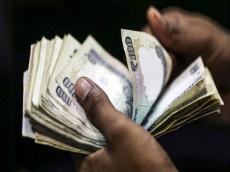|
|
TODAY.AZ / World news
Indian govt spends nearly Rs 100 L cr on development, social sector schemes in 8 yrs
11 April 2022 [09:00] - TODAY.AZ

By Trend
The Indian government has spent around Rs 100 lakh crore on infrastructure development and social sector programmes over the last eight years, government sources said, Trend reports citing The Print.
Citing an RBI report, sources said that the total developmental expenditure by the central government was a whopping Rs 90,89,233 crore (Rs 90.9 lakh crore) during 2014-15 to 2021-22.
Earlier this month, former finance minister P Chidambaram had pointed out that the government under Prime Minister Narendra Modi collected Rs 26.5 lakh crore from fuel tax collections between 2014-2021 but the total outgo on free food grain, cash allowances to women, PM-KISAN and other cash transfers is “no more than Rs 2,25,000 crore — which is less than the annual fuel taxes collected by the Centre alone.
The numbers posed by the former finance minister fall way short of the mark as development expenditure was nearly four times, government sources said.
Sharing details of expenditure, sources said, this included more than Rs 26 lakh crore in the form of capital expenditure to modernise infrastructure and create productive assets, Rs 25 lakh crore for food, fertilizer and fuel subsidies, and Rs 10 lakh crore on social services such as health, education, affordable housing, etc.
It is clear then, that the collections from the fuel tax have been put to good use as developmental expenditure, sources said, adding, it is unfortunate that a former Finance Minister would miss out these basic data points.
Taking to Twitter, Chidambaram had last week said that in the eight years of the Modi government, the central government collected Rs 26,51,919 crore as fuel taxes.
“There are approximately 26 crore families in India. That means from every family the central government has collected, on average, Rs 1,00,000 as fuel tax!” the former Union finance minister said.
“Ask yourself, what did an average family get in return for paying this huge amount as fuel tax?” Chidambaram said.
Rates have been increased across the country and vary from state to state depending upon the incidence of local taxation.
URL: http://www.today.az/news/regions/218467.html
 Print version
Print version
Connect with us. Get latest news and updates.
See Also
- 18 November 2024 [23:50]
North Korea launched garbage balloons into South Korea again - 18 November 2024 [22:27]
Milan topped list of most comfortable cities in Italy - 18 November 2024 [21:22]
US nuclear submarine entered the port of South Korea to replenish supplies - 18 November 2024 [20:18]
Finland raises defense spending to required NATO level - 18 November 2024 [13:23]
Pashinyan confirms high-profile resignations in Armenian government - 17 November 2024 [23:21]
Taiwan Foreign Minister leads drone tech delegation to Lithuania - 17 November 2024 [22:27]
Xi Jinping seeks stable US-China relations ahead of Trump’s return to office - 17 November 2024 [21:30]
Australia, Japan, and US strengthen military cooperation to counter China - 17 November 2024 [20:34]
Trump appoints fossil fuel Executive Chris Wright as Energy Secretary in second term - 17 November 2024 [19:20]
Voting begins in Senegal’s early Parliamentary Elections for New National Assembly
Most Popular
 Azerbaijan and COP29: a real approach and an example for everyone
Azerbaijan and COP29: a real approach and an example for everyone
 Macron received a slap in the face from the Vatican
Macron received a slap in the face from the Vatican
 Baku made Paris panic. What was Macron afraid of?
Baku made Paris panic. What was Macron afraid of?
 Azerbaijani activists protest U.S. Congressman Frank Pallone, demand apology and legal action
Azerbaijani activists protest U.S. Congressman Frank Pallone, demand apology and legal action
 COP29 panel explores role of SMEs in green economy transition
COP29 panel explores role of SMEs in green economy transition
 USA, South Korea & Japan strengthen their missile defense capabilities
USA, South Korea & Japan strengthen their missile defense capabilities
 Azerbaijan, UN Office on Drug & Crime mull coop in combating transnational crime
Azerbaijan, UN Office on Drug & Crime mull coop in combating transnational crime
